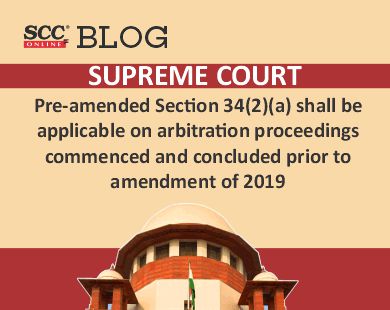Supreme Court: In an appeal against the impugned judgment and order passed by the Karnataka High Court, wherein the Court has a set-aside the order passed by the Additional City Civil and Sessions Judge, and has permitted the respondents to adduce evidence in an application under Section 34 of the Arbitration & Conciliation Act, 1996 (‘A&C Act’), the division bench of MR Shah* and CT Ravikumar held that in case of arbitration proceedings, commenced and concluded prior to the amendment of Section 34(2)(a) by Act, 2019, pre-amendment of Section 34(2)(a) shall be applicable.
Further, it said that a strong exceptional case is made out by the respondents to permit them to file affidavits/adduce additional evidence. However, at the same time, the appellant also can be permitted to cross-examine and/or produce contrary evidence. Thus, it was also held that the High Court has not committed any error in permitting the respondents to file affidavits/additional evidence in the proceedings under Section 34 of the A&C Act.
In the case at hand, the respondents had filed an application under Section 34 of the A&C Act against the award passed by the arbitrators. The impugned judgment and order passed by the High Court permitting the respondents to adduce evidence/additional evidence in the proceedings under Section 34 of the Act is the subject matter of the present appeal.
The issue in the present appeal was, whether the applicant can be permitted to adduce evidence to support the ground relating to public policy in an application filed under Section 34 of the Arbitration & Conciliation Act, 1996?
The Court noted that, in the present case the arbitration proceedings commenced and even the award was passed by the Arbitral Tribunal in the year 1998, i.e., prior to Section 34(2)(a) came to be amended vide the Arbitration and Conciliation (Amendment) Act, 2019 (‘Act ,2019′), and opined that Section 34(2)(a) pre-amendment shall be applicable.
The Court said that it has taken this view, because by amendment of Section 34(2)(a) by Act 2019, there is a substantial change. Prior to the amendment of Section 34(2)(a), an arbitral award could be set aside by the Court if the party making an application “furnishes proof” and the grounds set out in section 34(2)(a) and section 34(2)(b) are satisfied. However, after the amendment, the words “furnishes proof” have been substituted by the words “establishes on the basis of the record of the Arbitral Tribunal”. Thus, it held that in case of arbitration proceedings commenced and concluded prior to the amendment of Section 34(2)(a) by Act, 2019, pre-amendment of Section 34(2)(a) shall be applicable.
The Court took note of Fiza Developers & Inter-Trade (P) Ltd. v. Amci (I) (P) Ltd., (2009) 17 SCC 796 ,Canara Nidhi Ltd. v. M. Shashikala, (2019) 9 SCC 462, and Emkay Global Financial Services Ltd. v. Girdhar Sondhi, (2018) 9 SCC 49, and said that:
-
The ratio of the aforesaid three decisions on the scope and ambit of section 34(2)(a) pre-amendment would be that applications under Sections 34 of the A & C Act are summary proceedings.
-
An award can be set aside only on the grounds set out in section 34(2)(a) and section 34(2) (b)
-
Speedy resolution of the arbitral disputes has been the reason for enactment of 1996 Act and continues to be a reason for adding amendments to the said Act to strengthen the aforesaid object
-
An application for setting aside the arbitral award will not ordinarily require anything beyond the record that was before the arbitrator.
However, if there are matters not containing such records and the relevant determination to the issues arising under section 34(2)(a), they may be brought to the notice of the Court by way of affidavits filed by both the parties’, the cross-examination of the persons swearing in the affidavits should not be allowed, unless necessary, as the truth will emerge on the reading of the affidavits filed by both the parties.
Therefore, in an exceptional case being made out and if it is brought to the Court on the matters not containing the record of the arbitrator that certain things are relevant to the determination of the issues arising under section 34(2)(a), then the party who has assailed the award on the grounds set out in section 34(2)(a) can be permitted to file affidavit in the form of evidence. However, this shall be allowed unless absolutely necessary.
The Court said that the ground that the arbitral award conflicts with the public policy of India, could be available only after passing of the award. Therefore, the same can be permitted to be agitated in an application under Section 34 of the Act and the person shall not have to wait till the execution is filed. The defence that the arbitral award conflicts with the public policy of India itself can be a ground to set aside the award in view of section 34(2)(b) of the Act.
The Court held that the High Court has not committed any error in permitting the respondents to file affidavits/additional evidence in the proceedings under Section 34 of the A&C Act.
[Alpine Housing Development Corpn. (P) Ltd. v. Ashok S. Dhariwal, 2023 SCC OnLine SC 55 decided on 19-01-2023]
*Judgment by: Justice MR Shah
*Apoorva Goel, Editorial Assistant has reported this brief.







